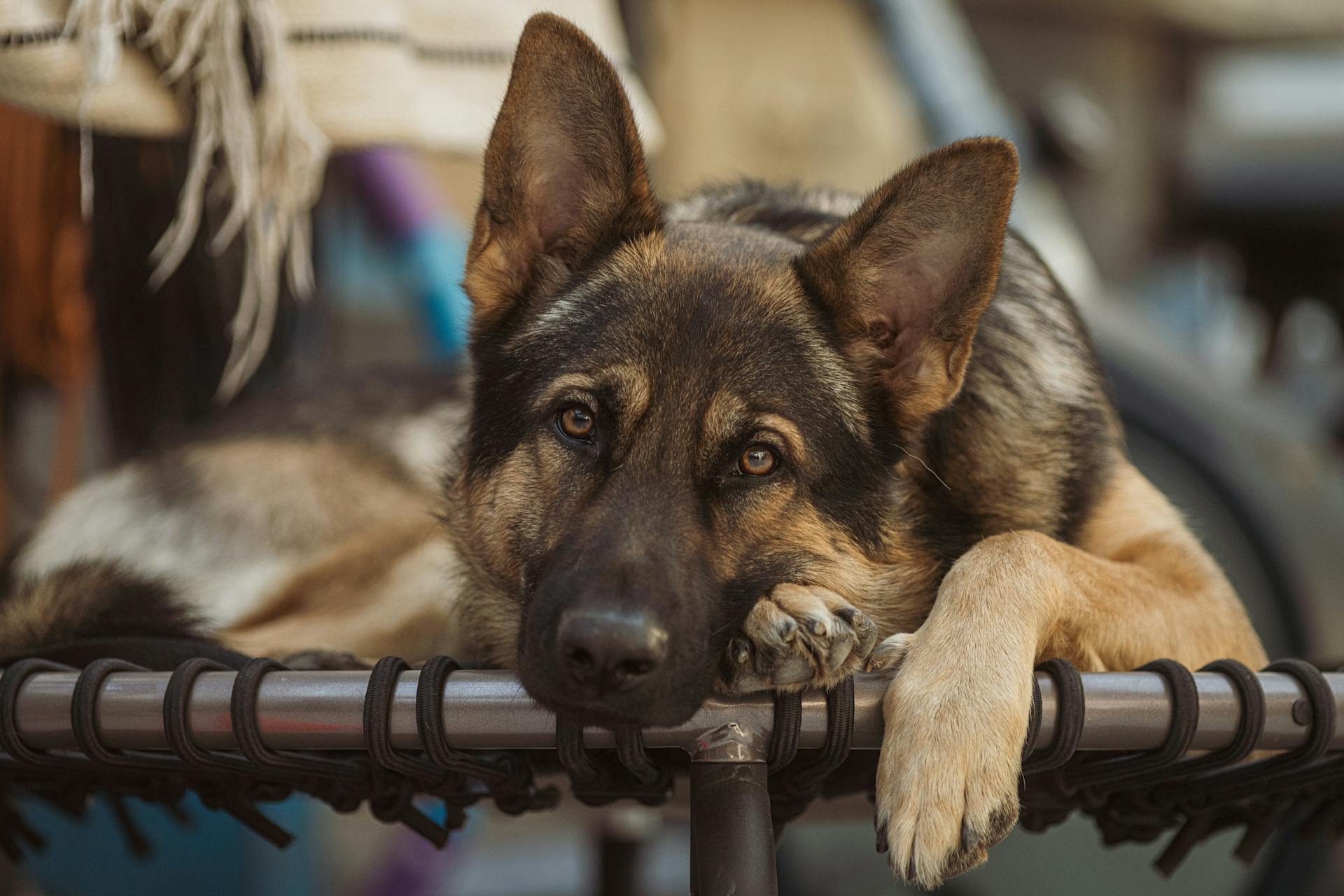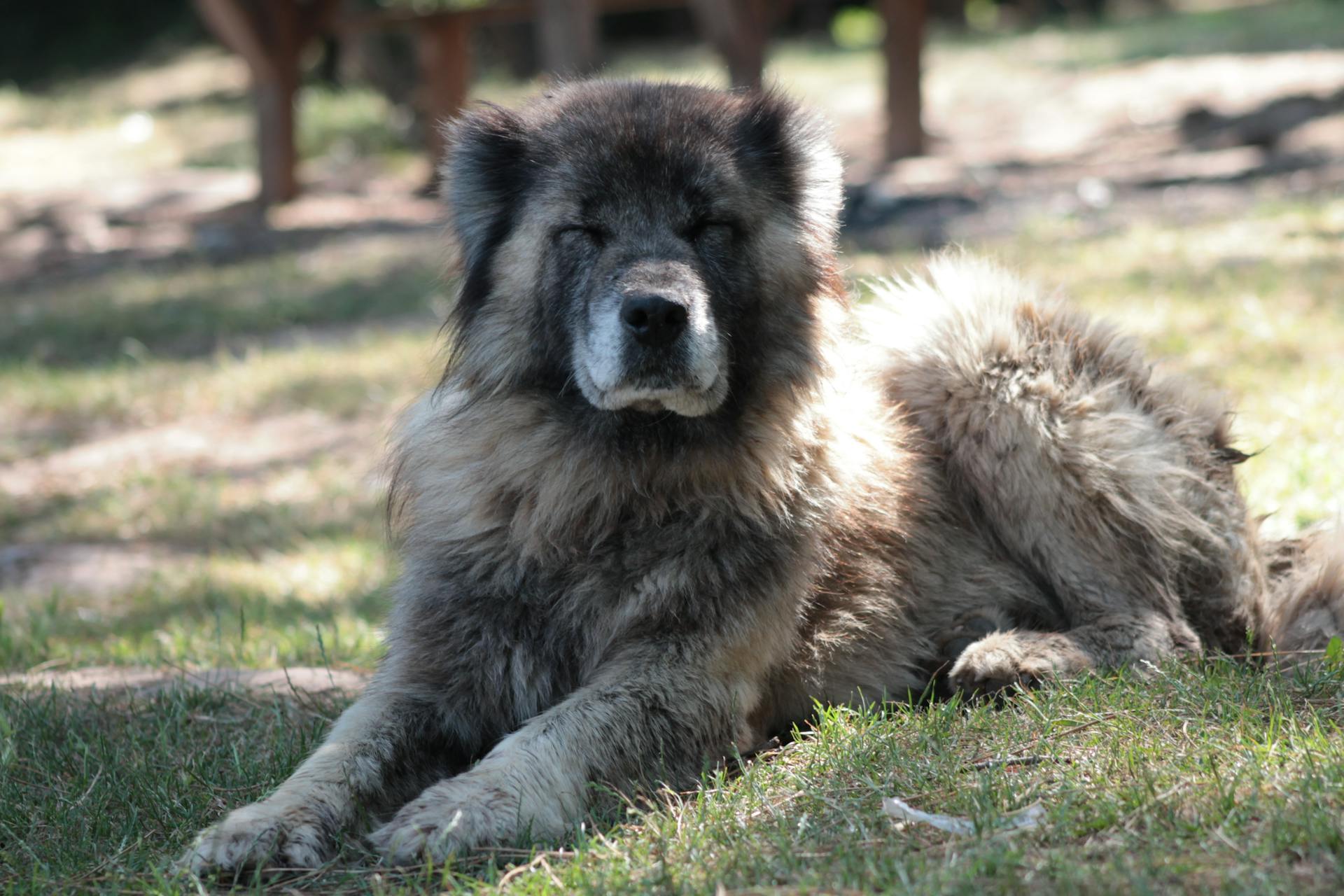
The Caucasian Shepherd is an ancient breed with a rich history, originating from the mountainous regions of the Caucasus. They're a large and powerful dog, typically weighing between 80-150 pounds.
Their independent nature can make them challenging to train, but with patience and consistency, they can learn to obey commands. In fact, they're highly intelligent and can even learn to perform complex tasks.
One of the most notable characteristics of the Caucasian Shepherd is their loyalty and protective instincts. They're naturally wary of strangers and will defend their family if they feel threatened. This makes them excellent guard dogs, but also requires careful socialization to prevent aggression.
Their thick coat requires regular grooming, but it's worth it for the beautiful, fluffy results. Regular exercise is also essential to keep them happy and healthy, with daily walks and playtime recommended.
Temperament & Intelligence
The Caucasian Shepherd is a breed that's not for the faint of heart. They're bold, confident, and fierce when they sense nearby threats, but soft, loyal, and kind toward their family members.
They're highly territorial and protective, making them excellent watchdogs. In fact, they're one of the best watchdogs, with a keen sense of hearing and vocal cords that will alert you to any suspicious activity.
However, their intelligence can be a double-edged sword. While they're capable of being loving and loyal family dogs, they can also be stubborn and resistant to training. In fact, they rank average in the intelligence ranking of dogs, requiring patience and consistency to teach them new commands.
Here's a breakdown of their trainability and intelligence:
As an experienced dog owner, you'll appreciate their ability to learn and adapt. But as a novice owner, you may find their stubbornness challenging to manage.
Temperament
The Caucasian Ovcharka's temperament is a complex mix of boldness, loyalty, and protectiveness. They can be wary of strangers and highly territorial, making them excellent guard dogs.
These dogs are highly intelligent, but also stubborn, which can make training challenging. They require firm boundaries, consistency, and patience from their owners.
Caucasian Ovcharkas are naturally distrustful of strangers and can be aggressive towards dogs or other animals they're not familiar with. In contrast, they're loving and loyal to their family members.
Here are some key temperament traits of the Caucasian Ovcharka:
Caucasian Ovcharkas are not for novice dog owners, as they require experience and patience to train. With proper socialization and training, they can be wonderful family dogs, loving and loyal to their owners.
Bite Characteristics
The Caucasian Ovcharka's bite characteristics are quite impressive, with a bite force of above 400 PSI, making them one of the strongest breeds in terms of bite force.
This is a testament to their powerful and large stature, and it's essential to respect their PSI and take precautions when interacting with these dogs.
The Caucasian Ovcharka's bite force is so strong that it's considered one of the strongest in the canine world.
Their powerful nature requires proper training and socialization to ensure they don't become aggressive or protective of themselves and their families.
If this caught your attention, see: Caucasian Mountain Shepherd Breeders
The Caucasian Ovcharka has a relatively low chance of biting someone, with a low biting potential.
However, it's essential to teach them good manners and not to nip or herd people, as they have a higher tendency to do so.
Here are some reasons why dog bites happen, according to available online statistics:
- Protection
- Pain
- Excitement
- Herding instinct
- Being provoked
Family-Friendly
The Caucasian Shepherd can be a loving family pet, but it's crucial to remember that they can grow up to 170 pounds, making them a significant consideration for families with young children.
They are loyal and protective, which can be a great asset as a watchdog, but it also means they can be cautious around strangers and may exhibit aggression at times.
Early socialization training is essential to help them feel comfortable around new people and children, and it's best to introduce them to visiting kids with calm, proper introductions and known humans present.
Their natural herding instincts can cause them to be pushy toward children, and they may see rough play as an attack on their human family member, so it's vital to supervise playtime and train children on how to handle animals.
Caucasian Shepherds are best suited to homes with older children and no other pets, as they can be territorial and aggressive to other dogs unless properly socialized.
If this caught your attention, see: Are Cattle Dogs Good Pets
Pet Compatibility
The Caucasian Shepherd is a loyal and loving breed, but when it comes to pet compatibility, they can be a bit of a challenge. They may be able to live harmoniously alongside other pets if they're brought up together and trained and socialized properly.
However, their propensity toward aggression may make them incompatible with other animals. Early socialization is key to increasing the likelihood of introducing a Caucasian Shepherd to other household pets.
In fact, it's recommended to begin their socialization training early, especially around children, as they can be pushy toward kids and may see rough play as an attack on their human family member. Children should be supervised during play and trained on how to handle animals to avoid incident.
Here's a breakdown of the Caucasian Shepherd's pet compatibility:
It's also worth noting that the Caucasian Shepherd's natural herding instincts can take over, causing them to be territorial and aggressive to other dogs unless they've been raised with them. If you're considering bringing a Caucasian Shepherd into your family, it's essential to have a calm and patient household, with plenty of space for them to roam and play.
Owning Essentials
Owning a Caucasian shepherd requires some specific attention to their grooming needs. They come in different coat types, and the long-coated variety will need daily brushing to prevent mats.
Their grooming needs are manageable, as they're not constant shedders, shedding their coats only once a year. However, they will need regular nail trimming and ear cleaning.
You'll also need to start training early and be consistent, as they can be difficult to obedience train due to their independent streak. But, they are known to be fast learners.
Positive reinforcement is key to successful training, and treating them as a member of your family will make the process easier.
Suggestion: Pros and Cons of Crate Training
Exercise
The Caucasian Shepherd is a breed that requires regular exercise to stay happy and healthy. They need a yard to run around in, which makes them not ideal for apartment living.
They do well with families who stay active and take them for daily walks. In fact, they have good enough stamina for walking and hiking. However, it's essential to keep them leashed when on outings with them.
If you live in an apartment, it's possible to keep a Caucasian Shepherd indoors, but they'll need careful exercise and several walks a day. They're not the best choice if you prefer a quiet breed, as they can be vocal and bark loudly.
Here's a rough guide to their exercise needs:
Keep in mind that they're a low-energy breed compared to others, but they still need regular exercise to stay happy and healthy. With the right care and attention, they can thrive in a variety of living situations.
Health and Lifespan
The Caucasian Shepherd is a robust breed, but like all dogs, they can be prone to certain health concerns. Hip dysplasia is a common problem in large breeds like the Caucasian Shepherd, which can lead to joint instability and arthritis.
Elbow dysplasia is another developmental disorder affecting the elbow joint, causing pain and lameness in affected dogs. Bloat, or gastric dilatation-volvulus, is a life-threatening condition where the stomach fills with gas and twists on itself, requiring immediate veterinary attention.
Regular veterinary check-ups are crucial for this breed, especially to monitor their weight and prevent obesity, which can lead to joint problems and heart disease. Entropion, a condition where the eyelid rolls inward, can cause discomfort and potential eye problems.
The average lifespan of a Caucasian Shepherd is 10-12 years, which is relatively long for a giant breed. However, they can be prone to heart problems, elbow dysplasia, hip dysplasia, and entropion.
Here are some common health issues associated with the Caucasian Shepherd breed:
- Hip dysplasia
- Elbow dysplasia
- Bloat (gastric dilatation-volvulus)
- Obesity
- Entropion
It's essential to discuss these potential health issues with your breeder and veterinarian to ensure you're getting a healthy puppy. Regular check-ups and proper care can help prevent or manage these conditions.
Feeding and Diet
Caucasian Shepherd Dogs require a diet formulated for a giant breed with fairly low energy levels.
You should ask your veterinarian or a professional nutritionist to help you find the right kind of food and portion size for your individual dog. The appropriate diet will change from puppyhood to adulthood and may be altered depending on medical needs.
Smaller, more frequent meals may be recommended to prevent dogs from developing bloat, a life-threatening condition.
A Caucasian Ovcharka needs 4 to 7 cups of high-quality dry food a day, divided into two meals.
To prevent weight gain, it's essential to pay attention to your dog's weight and schedule more than one daily walk. You should also feed them quality dry dog food and maintain an active lifestyle together.
Caucasian Ovcharkas are prone to obesity, so it's crucial to find a happy medium between exercise and feeding. If you notice any weight gain, consult your veterinarian and make a diet plan.
Suggestion: Raw Food Dogs Pros Cons
Coat Color and Grooming
The Caucasian Shepherd Dog's coat is quite impressive, with three coat lengths to choose from: long, medium, and short. The longer the hair, the more pronounced the mane is around their necks and the feathering is around their hind legs and tails.
The coat is double-coated, with a fine and soft undercoat and a coarse and longer outer coat. This means they shed heavily once a year, but regular brushing can help move this process along more quickly.
To maintain their thick coat, you'll need to brush them at least twice a week to remove loose or dead hairs and prevent matting. They often have white markings on the body and a dark "mask" around the face.
Here are the possible coat colors for a Caucasian Shepherd Dog:
- Gray
- Fawn
- Red
- Cream
- Tan
- Solid white
- Brindle
- Large patches of two or more colors
It's worth noting that their thick coat can make bathing a chore, so you may want to consider bathing them as needed or relying on a professional groomer.
Size and Weight
Caucasian Shepherd Dogs are massive, with males weighing between 110 to 220 pounds and females averaging 100 to 180 pounds.
Males stand about 27 to 30 inches tall at the shoulder, while females are between 25 and 28 inches tall.
This breed is considered a giant, and their size can vary depending on their type and origin.
Here's a breakdown of the average size and weight of a Caucasian Ovcharka:
To keep your Caucasian Shepherd Dog at a healthy weight, feed them 4 to 7 cups of high-quality dry food a day, divided into two meals.
Final Thoughts
The Caucasian Ovcharka is a born and bred working dog, making them unsuitable for many homes and lifestyles due to their large size and aggressive tendencies.
They require a dedicated owner who knows how to handle a stubborn dog and is committed to training and socializing them despite the challenges that arise.
A large, fenced-in backyard is essential for this breed, as they need space to run around and exercise.
Older children who know how to respect boundaries are also a must, as an overly excited 100+ pound dog can be overwhelming and potentially hurtful.
In the right home, the Caucasian Ovcharka can make a fantastic watchdog and loving family companion.
Additional reading: Ovcharka Caucasian Shepherd
Quick Facts
The Caucasian Shepherd is a remarkable breed with a rich history. They originated in the Caucasus Mountains, between Europe and Asia.
Here are some key facts about this breed:
- Male Caucasian Shepherds typically stand 27.5-30 inches (70-76 cm) tall at the shoulder, weighing 110-154 pounds (50-70 kg), while females stand 26.5-29 inches (67-74 cm) tall, weighing 90-110 pounds (41-50 kg).
- The breed group is Working, which means they were originally bred for a specific purpose.
- Caucasian Shepherds have a lifespan of 10-12 years, which is a relatively long life for a large breed.
- Their coat is a notable feature, with a long, thick, double coat that can be straight or curly.
- These dogs are known for their independent and protective nature, making them wary of strangers.
Here's a quick rundown of their exercise and training needs:
- They require high exercise to stay happy and healthy.
- Consistent training from an early age is essential to develop good behavior and prevent unwanted habits.
Unfortunately, like many breeds, Caucasian Shepherds can be prone to certain health issues, including hip dysplasia, elbow dysplasia, and eye problems.
Frequently Asked Questions
Are Caucasian shepherds good house dogs?
Yes, Caucasian Shepherds can make loving and devoted family pets, but they require careful consideration and proper training due to their strong guarding instincts.
Why is it hard to train a Caucasian Shepherd?
Caucasian Shepherds can be challenging to train due to their strong independence and wariness of strangers and unfamiliar dogs. Working one-on-one with a well-informed trainer may be a more effective approach.
Are Caucasian shepherds good with strangers?
Caucasian shepherds can be protective of their family and territory, potentially becoming aggressive around strangers. Proper training and socialization are crucial to help them feel comfortable around new people.
Sources
Featured Images: pexels.com


